|
|
|
Sort Order |
|
|
|
Items / Page
|
|
|
|
|
|
|
| Srl | Item |
| 1 |
ID:
102194


|
|
|
| 2 |
ID:
129926
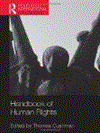

|
|
|
|
|
| Edition |
2nd ed.
|
| Publication |
Oxon, Routledge, 2012.
|
| Description |
xxiii, 744p.Hbk
|
| Standard Number |
9780415480239
|
|
|
|
|
|
|
|
|
|
|
|
Copies: C:1/I:0,R:1,Q:0
Circulation
| Accession# | Call# | Current Location | Status | Policy | Location |
| 057710 | 323/CUS 057710 | Main | On Shelf | Reference books | |
|
|
|
|
| 3 |
ID:
130054


|
|
|
|
|
| Publication |
2014.
|
| Summary/Abstract |
There is an ongoing debate about whether microfinance has a positive impact on education and health for borrowing households in developing countries. To understand this debate, we use a survey designed to meet the conditions for propensity score matching (PSM) and examine the impact of household credit on education and healthcare spending by the poor in peri-urban areas of Ho Chi Minh City, Vietnam. In addition to matching statistically identical non-borrowers to borrowers, our estimates also control for household pre-treatment income and assets, which may be associated with unobservable factors affecting both credit participation and the outcomes of interest. The PSM estimates show a significant and positive impact of borrowing on education and healthcare spending. However, further investigation of the effects of the treatment reveals that only formal credit has a significant and positive impact on education and healthcare spending, while informal credit has an insignificant impact on spending. This paper contributes to the limited literature on peri-urban areas using evidence from one of the largest and most dynamic cities in Southeast Asia.
|
|
|
|
|
|
|
|
|
|
|
|
|
|
|
|
| 4 |
ID:
132975


|
|
|
|
|
| Publication |
2014.
|
| Summary/Abstract |
While many find cause for optimism about the use of law and rights for progressive ends, the academic literature has long been skeptical that courts favor the poor. We show that, with the move toward a robust "new constitutionalism" of social and economic rights, the assumptions underlying the skepticism do not always hold. Our theories must account for variation in the elite bias of law and litigation. In particular, we need to pay closer attention to the broad, collective effects of legal mobilization, rather than focusing narrowly on the litigants and the direct benefits they receive. We support the claim by showing that litigation pursued in legal contexts that create the expectation of collective effects is more likely to avoid the potential anti-poor bias of courts. On the other hand, policy areas dominated by individual litigation and individualized effects are more likely to experience regressive outcomes. Using data on social and economic rights cases in four countries, we estimate the potential pro-poor impact of litigation by examining whether the poor are over- or under-represented among the beneficiaries of litigation. We find that the impact of courts is positive and very much pro-poor in India and South Africa, and slightly negative in Indonesia and Brazil. Overall, we challenge the tendency in the literature to focus on the direct effects of litigation, find that the results of litigation are more positive for the poor than the conventional wisdom would lead us to expect, and offer an explanation that accounts for part of the variation while raising a number of questions for future research.
|
|
|
|
|
|
|
|
|
|
|
|
|
|
|
|
| 5 |
ID:
139220
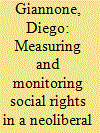

|
|
|
|
|
| Summary/Abstract |
The article aims to describe how the measurement and monitoring of human rights have been changed and weakened by the neoliberal resistance to social rights. In so doing, the study describes the political and ideological context which stimulated the broad conception of human rights included in the Universal Declaration of Human Rights. It then focuses on the ideological turn which occurred over the 1970s from welfare democracy to neoliberal democracy and the neoliberal approach to human rights. Based on a neo-Gramscian approach, the study considers political and ideological reasons as key in explaining both the rise and fall of social rights and the changes in their measurement. As a case in point, the article analyses the work of the UN in measuring and monitoring human rights. In spite of the use by the UN committees of indicators and guidelines aimed at measuring and monitoring the progressive realization of all human rights, results show that the reluctance of many states to implement social and economic rights makes UN efforts ineffective. Both states’ reluctance and instruments’ ineffectiveness can be ascribed to the neoliberal delegitimization of social rights, which is likely to persist in spite of the recent economic crisis.
|
|
|
|
|
|
|
|
|
|
|
|
|
|
|
|
| 6 |
ID:
073520
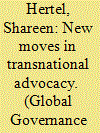

|
|
|
|
|
| Publication |
2006.
|
| Summary/Abstract |
Activists involved in human rights advocacy across borders may share common interests in changing the status quo¾but they do not always agree on the rights centrally at issue, nor the best strategy for promoting and protecting them. This is particularly true in campaigns in which "economic rights" claims emerge. Two new mechanisms I develop in this article shed light on the complexities of transnational advocacy and norms evolution. Two case studies offer insights into the operationalization of the mechanisms: a campaign to prevent child labor inBangladesh, and a campaign to prevent employment discrimination against pregnant workers in Mexico.
|
|
|
|
|
|
|
|
|
|
|
|
|
|
|
|
| 7 |
ID:
055257


|
|
|
| 8 |
ID:
095040


|
|
|
|
|
| Publication |
2010.
|
| Summary/Abstract |
Using the ITERATE dataset, we explore the origins of transnational terrorist activity, from 1982 through 1997, in 118 countries. We model terrorism, not as a function of a nation's ethnic, religious or linguistic fractionalization, but as an independent measure of perceived ethnic tensions. When we control for institutional quality, evidence that political rights and civil liberties mitigate the terrorism-producing effects of ethnic tensions exists only since 1990. Economic freedoms, on the other hand, robustly reduce the number of terrorist attacks originating in ethnically tense societies.
|
|
|
|
|
|
|
|
|
|
|
|
|
|
|
|
| 9 |
ID:
130050


|
|
|
|
|
| Publication |
2014.
|
| Summary/Abstract |
Over the last thirty years, economic growth, job creation and poverty reduction rates in Latin America and the Caribbean (LAC) have been much lower than in East Asia. However, thanks to democratization, the end of structural adjustment policies and renewed economic growth since 2002, LAC has succeeded in reducing poverty and inequality, one of the region's seemingly intractable problems. Growing public social investment and the extension of social protection have both supported this development. Social protection measures have included innovative poverty reduction programmes, such as conditional cash transfers and non-contributory pensions for the elderly and disabled. Today, building on this progress, several LAC countries are moving towards comprehensive social protection systems, which entail the adoption of universal policies and safeguarding citizens' social and economic rights. Given the challenges that many Southeast Asian countries are still facing in this respect, it is thus worth assessing the extent to which social protection has contributed to reducing poverty and inequality in LAC.
|
|
|
|
|
|
|
|
|
|
|
|
|
|
|
|
| 10 |
ID:
127765


|
|
|
|
|
| Publication |
2014.
|
| Summary/Abstract |
This article describes and analyzes two approaches in South Korean civil society to the issue of human rights in North Korea: a civil and political rights-based approach and an economic, social, and cultural rights-based approach that emphasizes the right to food. By analyzing the relationship between the policy stances of South Korean administrations in respect of North Korean human rights (NKHR) and NGO (nongovernmental organization) advocacy, this essay argues that South Korean humanitarian and human rights NGOs contributed to the adoption of different human rights norms in South Korean society. Since 2000, South Korean humanitarian NGOs separated civil and political rights (CPR) concerns from economic, social, and cultural rights (ESCR) concerns and selectively adopted the latter by limiting these human rights to the "right to food." Under the hard-line policy of the Lee Myung-Bak administration (2008-2012), South Korean human rights NGOs resumed active advocacy targeting the international community by exposing poor CPR situation in North Korea through transnational human rights networks given the CPR approach and this led to the dominance of the CPR approach in South Korean civil society. Thus, humanitarian and human rights NGOs in South Korea narrowed the focus of human rights norms to CPR and this emphasis influenced and shaped the way later political administrations in South Korea viewed human rights issues related to North Korea.
|
|
|
|
|
|
|
|
|
|
|
|
|
|
|
|
| 11 |
ID:
127767
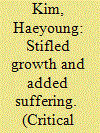

|
|
|
|
|
| Publication |
2014.
|
| Summary/Abstract |
The United States rhetorically promotes a nuclear-free North Korea with an open economic system, eager for the country to become an integrated member of the global community. Sanctions Washington has imposed on Pyongyang since the outbreak of the Korean War, however, have failed to advance this objective. Indeed, sanctions have proven to be counterproductive. While having a negligible effect on North Korea's nuclear and missile programs, sanctions also restrict the inflow of foreign investment, thereby stymieing North Korea's efforts to recalibrate its economic system. The dearth of foreign investment further limits the establishment of market-based exchanges that would facilitate economic liberalization, a process that could improve economic security in North Korea. It is the North Korean people, moreover, not the governing elite, who bear the ultimate costs and suffer under these sanctions, creating undeniable tension when considering the causal relationship between economic sanctions and human rights. Despite assurances offered by U.S. administrations that sanctions policies exclusively target the government, this article argues that economic restrictions play a significant role in the country's economic woes, inhibiting Pyongyang from improving the standard of living for the North Korean people and failing to promote an improvement in basic economic rights.
|
|
|
|
|
|
|
|
|
|
|
|
|
|
|
|
| 12 |
ID:
072298


|
|
|
|
|
| Publication |
2006.
|
| Summary/Abstract |
Measuring human rights is a complex challenge-particularly economic rights, which are by definition "progressively realized" (hence, must be measured over time) and are often conflated with measures of economic development. This article provides an overview of contemporary scholarly and policy efforts at measuring economic rights. It argues for an approach that captures both policy performance and the process by which economic rights can be realized in different societies, over time. Drawing on the author's own research with grassroots economic rights advocates, the article also highlights the political imperative of more effectively measuring such rights.
|
|
|
|
|
|
|
|
|
|
|
|
|
|
|
|
| 13 |
ID:
129557
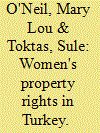

|
|
|
|
|
| Publication |
2014.
|
| Summary/Abstract |
This article takes Turkey as a case study, exploring marital and inheritance regimes with regard to their impact on women and their ability to protect women's property rights. The aim of the study is to bring to light the workings of the legal system that regulate the acquisition of property and to scrutinize the gap between the law and its practice in Turkish society. By taking this approach, the article does not only focus on laws but also on how these laws are adopted by society. Thus, two levels of analysis-de jure and de facto-are utilized for an investigation of women's property rights and hence their social and economic status.
|
|
|
|
|
|
|
|
|
|
|
|
|
|
|
|
|
|
|
|
|